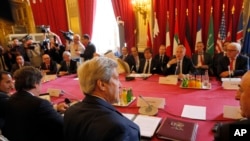The Syrian government has announced a 48-hour extension of a fragile localized cease-fire in Aleppo, where an uptick in fighting between the government and rebels has threatened a nationwide cessation of hostilities.
Syria’s state news agency, SANA, said the military announced an extension of the localized truce that took effect on Friday and was set to expire early Tuesday.
The U.S. and Russia helped negotiate similar localized cessations last month for Latakia and East Ghouta, as part of a bid to keep the February nationwide cessation of hostilities from unraveling.
Aleppo has been the scene of some of the worst fighting between the government and rebels in recent weeks. Since late April, nearly 300 civilians have been killed in the unrest, which has included airstrikes on hospitals.
U.S. officials say that while the overall goal is to get the nationwide cessation to hold in Syria, the incremental, localized truces can be beneficial.
“It is confidence-building,” said a senior State Department official Monday.
“If you can get past that 48 [hours]. If you can get that 72 [hours],” the official added.
Word of the extension in Aleppo came hours after the U.S. and Russia said their combined effort to quell unrest in Syria has resulted in a significant decrease in fighting in some areas, but that challenges remain.
In a joint statement, the two countries said fighting between the Syrian regime and rebels has dropped significantly in North Latakia and East Ghouta.
"However, we also recognize the difficulties faced by the CoH [cessation of hostilities] in several areas of the country, especially in the recent period," the U.S. and Russia said.
In a background briefing Monday, a U.S. official said that in recent days, overall fighting dropped in Aleppo, Syria's largest city, but "there have been pockets where that is not the case."
The official said some of the unrest involved the al-Nusra Front, a terrorist group that is not part of the cessation.
The U.S. and Russia are co-chairs of a cease-fire task force that has been monitoring violations of the truce.
International Syria Support Group
Also, Russia has been using its leverage with the Syrian regime, and the U.S. has been exerting pressure on the Syrian opposition to abide by agreement.
The U.S. and Russian joint statement came as U.S. Secretary of State John Kerry met in Paris with officials from France and several other countries that are part of the International Syria Support Group.
The 17-nation body has been backing a U.N.-facilitated effort for a political transition in Syria, a move that could ease the country’s internal unrest and bolster the multi-national effort to fight Islamic State in Syria.
Speaking on behalf of Arab and Western ministers meeting in Paris, French Foreign Minister Jean Marc Ayrault called for the Geneva talks to resume as soon as possible. For that to happen, he said at a news conference, "the cease-fire violations stop immediately and progress is achieved in delivering humanitarian aid to civilians on the ground."
Those remarks were echoed by the EU's foreign policy chief Federica Mogherini, who said, "there is no other way rather than the political way to solve the crisis in Syria" and to pave the way for humanitarian aid and a political transition."
Meeting, anti-corruption summit
Kerry is on a four-day diplomatic mission to Europe that includes a stop in London, where he will participate in an anti-corruption summit.
The anti-corruption gathering Thursday is being hosted by British Prime Minister David Cameron, and will be attended by heads of state from Afghanistan, Colombia and Nigeria, among others.
Cameron's summit is aimed at tackling global corruption, and comes just a few weeks after he was exposed in the leak of the so-called Panama Papers as having a stake in an offshore fund set up by his father. The British leader says he has done nothing wrong.
The public will have access to the Panama Papers, which mention various world leaders and dignitaries, beginning Monday.
Cameron called corruption "the root of so many of the world's problems," and said it is "an enemy of progress."
"For too long there has been a taboo about tackling this issue head-on. The summit will change that. Together we will push the fight against corruption to the top of the international agenda where it belongs," he said.
Russia will be represented at the summit by Deputy Foreign Minister Oleg Syromolotov. Norwegian Prime Minister Erna Solberg also will be in attendance.
While in Britain, Kerry also will meet with Oxford University students and give a speech at the Oxford Union.
VOA' Joshua Fatzick contributed to this report.












